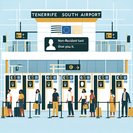
Despite three and a half years of Moscow’s war on Ukraine, Spain continues to process high volumes of Russian visa applications. New European Commission statistics published on 8 November 2025 show that Spanish consulates issued 111,187 short-stay Schengen visas to Russian nationals in 2024—behind only France (148,300) and Italy (126,900).
The figures come just weeks after the EU adopted tighter rules for Russian travellers. Multiple-entry visas have been scrapped and each visit now requires a fresh application, with more documentation and higher fees. Baltic and Nordic governments had lobbied for a complete ban, but larger member states—including Spain—argued that selective engagement is preferable to blanket restrictions that could punish dissidents, businesspeople and relatives already resident in the EU.
Madrid’s position reflects both economic and humanitarian considerations. Before the pandemic, affluent Russian tourists spent roughly €1 billion a year in Spain’s hospitality and real-estate sectors, and around 82,000 Russian citizens currently hold valid Spanish residence permits. Tour operators on the Costa Blanca and Catalunya warn that a drastic clamp-down would undermine post-COVID recovery just as the winter sun season begins.
![Spain Emerges as EU’s Third-Largest Issuer of Schengen Visas to Russians]()
At the same time, the Sánchez administration insists it is implementing the new EU rules faithfully. Consular sections in Moscow and St Petersburg have doubled interview slots for humanitarian applicants (family reunification, medical treatment, academic conferences) while cutting back on leisure travel appointments. Security vetting has also been reinforced in cooperation with Frontex and Spain’s National Police.
For multinational companies, the headline is clear: Russian staff who need to transit or work in Spain will face longer lead-times and single-entry visas only. Corporate mobility teams are urged to schedule travel at least six weeks in advance and to check that invitations, insurance and hotel bookings meet the stricter criteria. Spanish border officials report that the most common reason for refusal since September has been incomplete proof of accommodation.
Looking ahead, Brussels will review the measures in March 2026. If the war drags on, further harmonisation is likely—especially on biometrics once the EU’s Entry/Exit System (EES) is fully live next April. Companies with Russian assignees in Spain should therefore build flexibility into project timelines and consider remote-work alternatives where possible.
The figures come just weeks after the EU adopted tighter rules for Russian travellers. Multiple-entry visas have been scrapped and each visit now requires a fresh application, with more documentation and higher fees. Baltic and Nordic governments had lobbied for a complete ban, but larger member states—including Spain—argued that selective engagement is preferable to blanket restrictions that could punish dissidents, businesspeople and relatives already resident in the EU.
Madrid’s position reflects both economic and humanitarian considerations. Before the pandemic, affluent Russian tourists spent roughly €1 billion a year in Spain’s hospitality and real-estate sectors, and around 82,000 Russian citizens currently hold valid Spanish residence permits. Tour operators on the Costa Blanca and Catalunya warn that a drastic clamp-down would undermine post-COVID recovery just as the winter sun season begins.

At the same time, the Sánchez administration insists it is implementing the new EU rules faithfully. Consular sections in Moscow and St Petersburg have doubled interview slots for humanitarian applicants (family reunification, medical treatment, academic conferences) while cutting back on leisure travel appointments. Security vetting has also been reinforced in cooperation with Frontex and Spain’s National Police.
For multinational companies, the headline is clear: Russian staff who need to transit or work in Spain will face longer lead-times and single-entry visas only. Corporate mobility teams are urged to schedule travel at least six weeks in advance and to check that invitations, insurance and hotel bookings meet the stricter criteria. Spanish border officials report that the most common reason for refusal since September has been incomplete proof of accommodation.
Looking ahead, Brussels will review the measures in March 2026. If the war drags on, further harmonisation is likely—especially on biometrics once the EU’s Entry/Exit System (EES) is fully live next April. Companies with Russian assignees in Spain should therefore build flexibility into project timelines and consider remote-work alternatives where possible.










